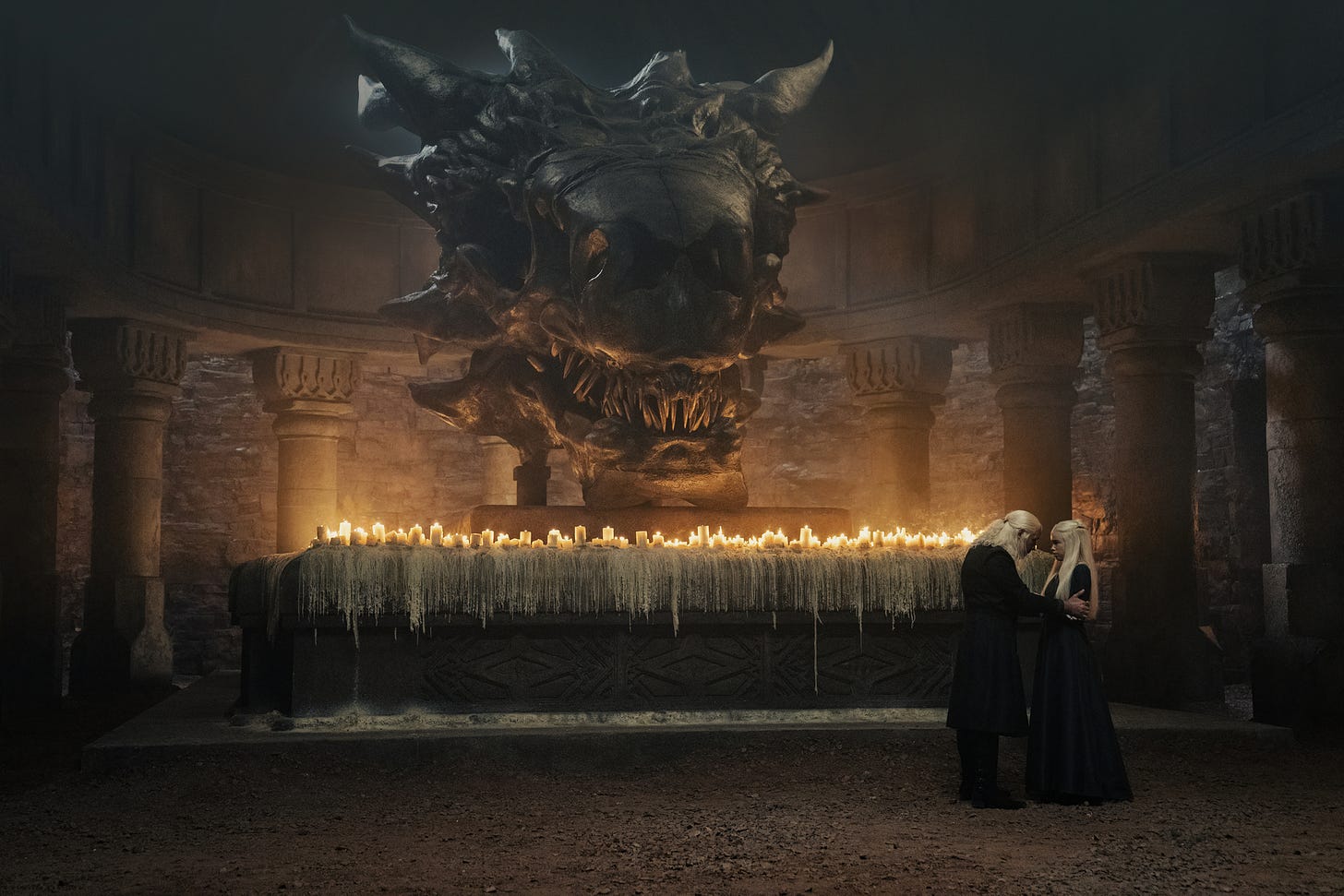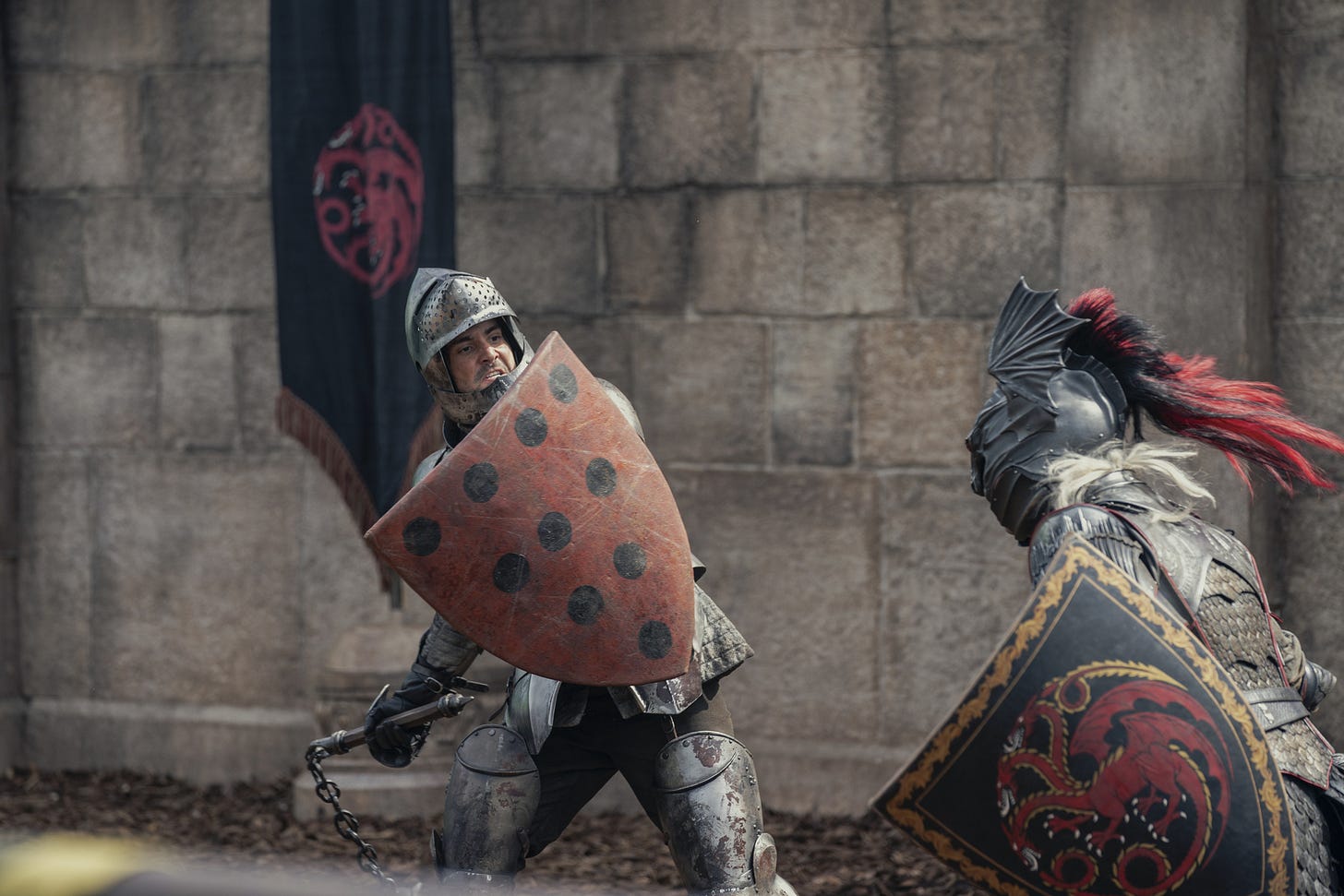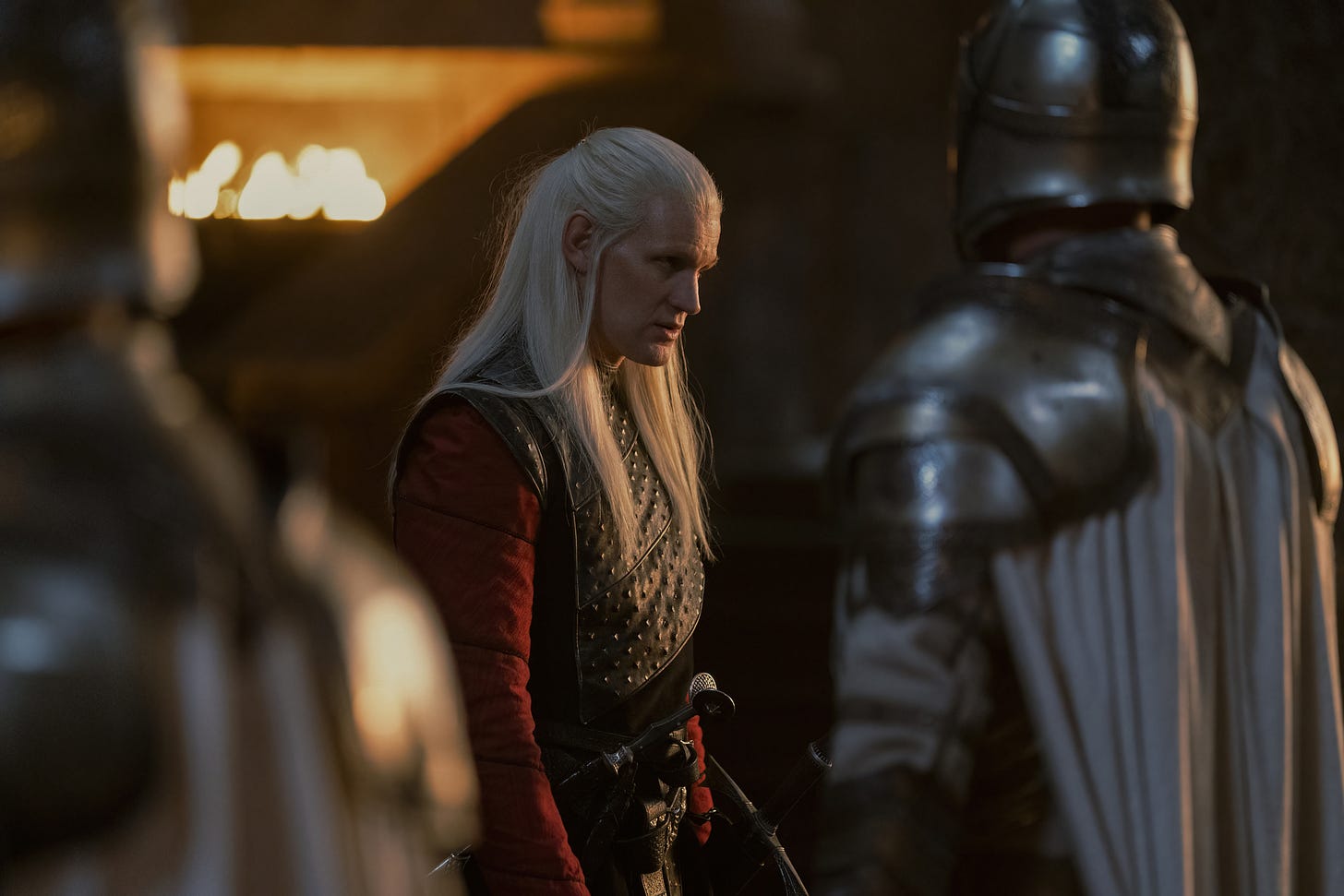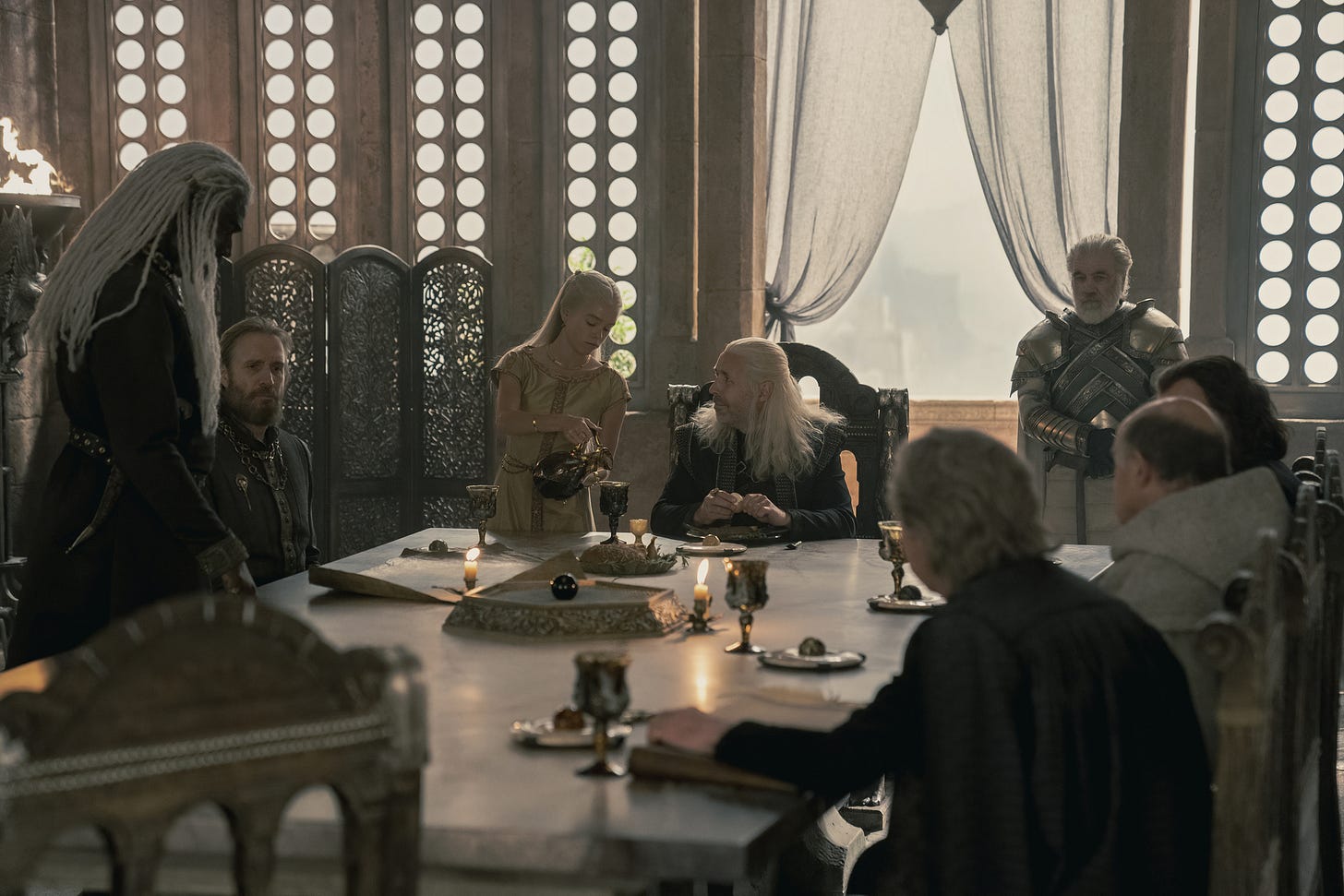Review: House of the Dragon, “The Heirs of the Dragon” | Season 1, Episode 1
Returning to Westeros feels familiar, but is there a hook beyond that?
[The following review is written from the perspective of someone who has read existing volumes of A Song of Ice and Fire, seen Game of Thrones, but has not read Fire & Blood. As such, there will be no spoilers, but tread carefully in the comment section.]
“The dream was clearer than a memory.”
Late in the episode, Viserys Targaryen confides in his daughter Rheanyra a secret, passed down to each Targaryen who sits on the Iron Throne, or who is named as a successor to it. Aegon the Conqueror, who had flown in from Dragonstone to rule over all of Westeros and unite the Seven Kingdoms, did not do so out of a lust for power, or as a sign of madness. Instead, he foresaw a dark winter descending over Westeros, accompanied by a terrifying threat, and the only thing that will stop it is a united seven kingdoms with a Targaryen on the throne.
It is the only moment in this premiere that explicitly frames the House of the Dragon as a prequel to Game of Thrones, and is notably a new addition to the canon of A Song of Ice and Fire, which just so happens to be the name given to the dream among the Targaryen heirs. It’s a reminder that with David Benioff and D.B. Weiss stepping away from the franchise, and with no other writers from the original series returning, George R.R. Martin himself is now the primary creative force behind whatever spinoffs, sequels, and other content emerges from HBO’s efforts to iterate off of their most successful show of all time. And with this revelatory retcon, Martin lets viewers know that at least in the minds of Viserys, the power struggle within the Targaryens themselves is not simply an isolated drama, but rather one part of a long lineage of stewards of Westeros’ very future.
That being said, however, everything about how House of the Dragon operates in this opening hour leans on our memory of Game of Thrones. After Rhaenyra’s opening narration that establishes us within the Targaryen dynasty, we get what I’d call a series of re-establishing shots—as she flies into frame on her dragon, they soar over King’s Landing, with the Red Keep and Flea Bottom pulling us back into the world bit by bit. And as she returns home after returning her dragon to its handlers, we see a King’s Landing alive with energy, and a Red Keep bustling with activity. We’ve seen this space like this before, but it was almost a decade ago, and we never saw a version of it with this much budget behind it—with fewer locations to wrestle with, House of the Dragon is instead committed to showing us the scale of this space we already know, reimagined with the budget Game of Thrones only achieved later in its run, and mostly spent on epic battles that (at least for now) are not part of this show’s milieu.
This is no clearer than in the Tourney scene. In the first season of Game of Thrones, we’re told that the tournament is a critical part of the naming of Ned as Hand of the King, but the actual event is a crowd in a field, because the budget didn’t give them the ability to communicate how much this form of heraldry is built into the culture of Westeros. By comparison, with a much larger budget and clearer expectations to go with it, the tourney Viserys throws in honor of his unborn child—which he dreams is the son he’s always wanted—is huge in scale, the royal box towering over the joust itself, with thousands in the crowd screaming their support and encouragement. This increase in scale doesn’t mean the scene is better than what Game of Thrones managed, mind you, but it’s able to communicate more information about this culture, which is critically important to selling this narrower vision into Westeros.
Because House of the Dragon is inherently narrower. Instead of focusing on three far-flung families, one of which sits on the throne, it narrows its point of view to the jostling of power in King’s Landing. Rhaenyra’s initial introduction gives us the recent history: a dying king with no heirs who opens up the bidding to his relatives, with the realm choosing the male Viserys over his cousin Rhaenys. It becomes a thematic backdrop for the story that emerges, as Viserys’ quest for a male heir dies alongside his wife, and he is forced to decide whether he will allow his ambitious brother Daemon to remain his heir or elevate Princess Rhaenyra against tradition. Although Viserys’ reveal of Aegon’s dream works to place this conflict amidst a longer lineage of Targaryen rule and Westerosi history, the focus on the path of Targaryen succession offers a natural locus of intrigue, using plot and character dynamics that certainly echo those we saw in Game of Thrones’ early seasons when the political dynamics of King’s Landing were a central part of the show.
The remaining question, for me, is whether I’m actually invested in these characters. Certainly Rhaenyra is the most dynamic, but although we open on her narration and on her flying through the sky on her dragon, I’m not necessarily convinced that we learn enough about her to really engage with her as a character. Certainly her position in the story is compelling, but we’re left with only a few glimpses of personality as she’s a bit flirty with Alicent and speaks High Valyrian with her uncle. We see her as her father’s cupbearer, but not enough to really see the dynamic between her and her father that she speaks about, and which kind of gets glossed over. I’m absolutely interested in seeing what she does as the new heir, but the events of this premiere feel like something that happens to her, and her reactions aren’t as central as they needed to be.
Elsewhere, I’m not sure House of the Dragon escapes its origins as a retelling of historical events. Viserys certainly has the largest emotional arc here, andthe character is well-drawn. He’s only king because he was a man, and as his wounds show he may not truly be worthy to sit on the Iron Throne, at least according to that bit of lore. And while he loved his wife, he pushed her through numerous miscarriages and stillbirths to keep pursuing a male heir, eventually being forced to sacrifice her life in hopes the baby could survive. But the weight of this tragedy, and the meaning of this transformation, is weakened by the fact we were just introduced to the character. I realize that they’re rushing to get to the most dynamic point in this bit of history—defying his brother’s claim and instead elevating his daughter—but in the process the story becomes more abstract, a plot development rather than a character development.
The same is true of said brother. Daemon Targaryen is, we learn, the origin behind the feared Gold Cloaks of the City Watch, but he’s also sadistic in the way Targaryens can be, and is just a loathsome creature from the moment we meet him. He trashes his wife and the entirety of the Vale, massacres “criminals” in the streets with impunity for crimes we don’t see, and speaks of his brother’s tragedy through the lens of his own fortunes. And quite simply, I don’t know how you come back from this. If he’s an outright villain, that’s fine, but I don’t know how that squares with the story they’re telling. His scenes with Rhaenyra are pitched differently, and he tries to insist to Viserys that he’s actually a better advisor to him than Otto Hightower because he understands his weaknesses and can account for them, but that reads as an unsympathetic position, and I’m not sure where you take a character like this one.
By comparison, the supporting characters at Viserys’ High Council offer more dynamism, although they are adjacent to the core story. As Hand of the King, Otto Hightower is in the position of wielding tremendous power, but always at the King’s behest, and learning that he was the one responsible for shipping Daemon around the various roles trying to diminish his ambition means he’s been trying to manage this situation for a while. His actions on the Council itself seem moral and just, but the way he pimps out his daughter to potentially be the next Queen as Viserys mourns his wife is deeply alarming in ways that reinforce that although Daemon may be positioned as an outright villain, no one is immune from the corruptive influence of power.
I’m equally interested in Rheanys and her husband, Lord Corlys, who have been forced to sit by and watch as a throne that could have been theirs is disputed without them. Whereas Daemon has stewed in his frustration with not being named Hand of the King, Rheanys and Corlys have accepted their duty, and sit at Court peacefully. The episode uses the tournament to reveal that there are still those in the realm who believe she should have been queen—when the knight asks for the favor of “The Queen Who Never Was,” it shows us the cracks in this peaceful time, not just within the Targaryen family itself but within Westeros as a whole, and it makes me intrigued at how these dynamics will shift and change.
Broadly, then, House of the Dragon promises a lot of palace intrigue, but I am not yet sure if that’s enough to keep me engaged. I’m not worried about a lack of action—it was never my primary interest in this franchise, and while I appreciate the occasional dragon flights they’re not really a major draw either. What was missing for me here was some type of levity. We get a glimpse at possible romance with tourney winner Ser Cristen Cole (and Rheanyra and Alicent with each other, frankly), but Daemon is too cruel to read as clever, and there’s just a distinct lack of mirth given the tragedy that defines the hour. The Targaryens are rich and interesting, but also a little bit humorless, and I wonder if centering an entire show around them is able to offer enough diverse characterization to feel as “whole” as Game of Thrones did.
It’s not an entirely fair comparison, and one I don’t want to get too stuck on, but I do think on a simple narrative level House of the Dragon is hurt by how it begins its story. The power of Game of Thrones’ first season is how it built to its huge turning point: we had an entire season with Ned before his beheading, and thus we had a strong understanding of the status quo before Joffrey burned it down. We knew what was at stake when Caetlyn made her error arresting Tyrion, or when Robert died, and that added weight to those moments that otherwise could have felt procedural.
House of the Dragon starts us at its own turning point, without giving us a chance to understand the full stakes of these events, and instead uses them as a crucible for introducing us to these characters. This is a valid way to start a story, perhaps, but I’m not sure if it’s a better one, and my apprehension is whether it will create the space for the show to let character rather than plot drive its action. There’s no definitive judgment to be made coming out of this premiere, of course, but it’s a marked shift from its predecessor, and one that will no doubt shape the story moving forward for better or for worse.
As a production, the premiere revels in its directorial continuity with said predecessor. Miguel Sapochnik has been given a rare credit as “co-showrunner” to reflect how critical he is to ensuring the show lives up to Game of Thrones’ visual spectacle, and this is a handsomely made and compelling hour of television. Similarly, although casting has been one area of change with Nina Gold sitting this one out, Kate Rhodes James (Sherlock) has nonetheless brought together a compelling assortment of performers, with Milly Alcock standing out as a solid find as Young Rhaenyra1 to be able to anchor what feels like the show’s central character. I’ve never really had any lack of confidence in HBO’s willingness to provide the resources necessary to create something that lives up to Game of Thrones in terms of the production itself, and this premiere affirmed that.
It’s possible that this single hour was enough to communicate to some people that they’re either all in on returning to Westeros or disinterested in this next chapter of HBO’s leveraging of their most valuable intellectual property. For me, though, the premiere is interesting enough to make me intrigued to see more, but makes some choices that have me questioning whether the balancing act of spinning off from Game of Thrones will be able to create truly great television. Which is to say that the start of House of the Dragon is not that atypical from other television pilots, and will be interesting to revisit when the rest of the season comes into focus.
Stray observations
So, as I wrote about on Friday and reflected on at Polygon, I chose not to read Fire & Blood, and I have to say that I’m appreciating being in this world without being burdened by what’s going to happen. I very much enjoyed playing “spot the foreshadowing” for five seasons, but then we had three seasons of “is this going to happen in the books” that were less fun, and this new mode where I’m able to be introduced to the characters and the story as we go along is a nice change of pace. It does mean that I now have to try to avoid spoilers, though, so I’m going to ask folks who have read the book to be on their best behavior in the comments (and if there’s enough demand, I’ll commit to the Episodic Medium Discord to give y’all a space to talk spoilers).
While Game of Thrones eventually diversified its characters, House of the Dragon commits up front with Lord Corlys, who is of House Velayron. For spoiler reasons I’m not going to look up the family to figure out if Corlys being Black is something Martin himself discusses, but I think the colorblind approach works in a context where House Velaryon is as old as House Targaryen but lacks the same power and respect. I don’t think there was any house in Martin’s main story that could have been colorblind cast without being forced to dramatically change the story for it to be meaningful, so we’ll see how this plays out.
I say I’m trying to avoid spoilers, but I decided to use the character guide HBO sent to help me get names right when taking notes, and when Aemma didn’t show up as a main character her fate was pretty clear the second I realized she was pregnant and about to go into labor. Without an opening credit sequence, the episode itself doesn’t really reveal its hand on that, so the perils of paratexts for me.
Speaking of: no opening credit sequence? I realize that it’s hard to follow what will go down as one of the most iconic in TV history, but to not even try? Disappointing.
They don’t spend a huge amount of time trying to articulate how this moment in history is different than the one we spend eight seasons in, but a Heart Tree in the Red Keep is certainly a change, although religion plays no significant role here with the Maesters mainly focused on medical care.
Putting stark white wigs on actors is a crapshoot if ever there was one, and they lost on Matt Smith (the others are fine).
We get glimpses of Baratheons and Starks, but the episode avoids going full “wink wink” with it, and I’m curious how that holds as time goes on.
They resisted showing us the actual invision for the c-section, but they still showed us lots of blood, and I appreciated that it was treated as a “gory” moment alongside the whole decapitation scene. Both are meant to demonstrate the gruesomeness of life and death, and made an impact on me.
As for the sex, we did indeed return to the brothels of King’s Landing, but as always I don’t think simply showing sex is a problem. The fact Daemon frequents the brothels gives him a space to articulate his separation from the palace, and while his paramour Mysaria may not have much character in the moment, she is listed as a main character, so I’m intrigued to see how her role evolves. And we did get equality in butt shots during their first sex scene, so there’s that at least.
Also, when Daemon gives his big speech there’s a dude who’s just paused in doggy style with one of the women, and it’s the only moment in the episode that made laugh, so I can’t be too mad at the brothel of it all.
I was wracking my brain to figure out why I found Eve Best so familiar as Rhaenys until I realized she was the friend in Nurse Jackie. Remember Nurse Jackie?
Welcome to Episodic Medium’s coverage of House of the Dragon. After a decade of covering Game of Thrones, I’m excited to dive back into this world, and about the possibility of having a dynamic and engaged comment section with which to do so. As noted above, the first review of each show is free here at Episodic Medium, but only paid subscribers will have access to all reviews for this season. However, your $5 a month will get you access to these reviews and Zack Handlen’s coverage of Rings of Power, along with reviews of major Star Wars and MCU projects airing in the months ahead. For a full schedule for the fall, check out our About Page. In addition, we’re running a 20% discount on full-year subscriptions, which are only $40 through September 9, and everyone who signs up for a yearly subscription during this period is entered into a draw for a signed copy of my book, Game of Thrones: A Guide to Westeros and Beyond.
I find this fascinating—how quickly are we jumping to the older actors (with Emma D’arcy taking over the role)? Next week? I’ve consciously been avoiding interviews and reviews, so intrigued to see when this transition happens, and whether we keep the other younger actors in flashbacks once we fastforward.










It's fascinating for me to dive into this a few days later, aware of the discourse, and find -- a high-fantasy series with really dynamic actors and glorious set-pieces that I'm excited to go back to next week! Makes me think other people are looking for something different from a GoT show. Yes, I hope to get deeply invested in the characters, but I love me some palace intrigue, and these actors (with the exception of Rheanyra, but the "coming soon" trailer has me excited about the change of actor) are so alive and fun to watch tear into the material. Could still go wrong, but Matt Smith sneering it up as a sadistic knight, I got no complaints.
I feel like there's a new trend of not doing a title card/opening credits for first episodes and then by episode 2 they will unveil it. Not sure why that's a thing now. This episode definitely felt like checking things off a list, with no humor or humanity in anything. I'll keep watching because as I told my comic book friend who is old enough to be jaded with MCU shit on Disney+ "well we already paid for it so might as well see what they did with our money." I love an enormous CGI budget can still be taken down by a few bad wigs. Looking forward to seeing where they go with this.